Michael B. Jordan On Knockout Directing Debut ‘Creed III,’ Trading Blows With Jonathan Majors
- Oops!Something went wrong.Please try again later.
- Oops!Something went wrong.Please try again later.
- Oops!Something went wrong.Please try again later.
- Oops!Something went wrong.Please try again later.
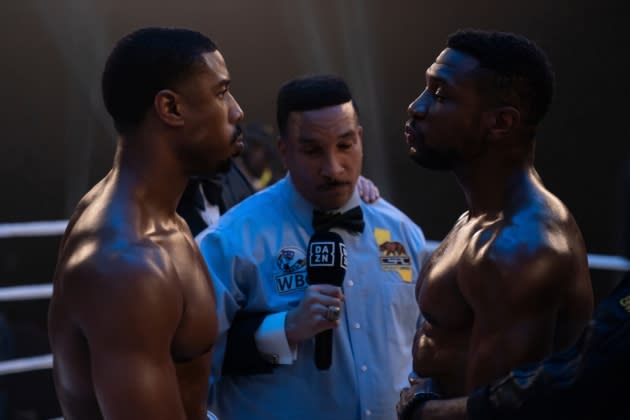
EXCLUSIVE: As his directorial debut Creed III was cresting toward a $100 million global opening weekend and setting numerous records — top opening for the Creed franchise and biggest sports film opening ever and a knockout victory for MGM, new parent Amazon & United Artists Releasing as the company embraces the theatrical release, and Warner Bros (which launched the film overseas) — Michael B. Jordan sat down with me Sunday night as those numbers were piling higher. It was the first in person interview for us since I met him and Ryan Coogler at Cannes for the launch of Fruitvale Station. Trying to rebound from my own family tragedy months earlier, that film was cathartic for me because it was the first time I grieved the death of my father in Hurricane Sandy. I shared that with them, and spent a lot of time with both, and especially Jordan. He was just stepping into stardom and we talked about everything from navigating such a famous name to how much he was obliged to give of himself in interviews and in public. This was at a surreal moment when he was still a little uneasy walking down the Croisette and hearing a person or two calling out “Where’s Wallace,” the meme line about his young character from the series The Wire. I recall walking away from Coogler and Jordan hoping they continued to make strong followup creative choices because all the potential was there. Who knew it might happen so quickly for each of them?
Last night, Jordan was tired after experiencing the kind of opening weekend first time directors dream of. He’s as easy to like as I remembered him being so long ago, when it was all so fresh and new for him. Way before he and his reps positioned him to be a globally branded hyphenate through the deal he made at Amazon for himself and partner Liz Raposo’s Outlier Society production banner. Here, he and Raposo discuss a most memorable weekend, how he pulled off a first time outing as director with style, shooting in IMAX and taking all the punches in the ring. And what it all might mean for his career and Outlier Society.
More from Deadline
Ryan Coogler's Proximity Media Hires Kelli Buchanan As VP Nonfiction
Michael B. Jordan And Jonathan Majors Liken Themselves To De Niro And Pacino In NY Times Interview
DEADLINE: I am catching you Sunday night after an enviable opening weekend. Did you go from theater to theater in disguise, seeing how audiences responded to Creed III?
MICHAEL B. JORDAN: The honest answer? No. I just stayed at home, playing Call of Duty and ordering a lot of food. For me, after going around the world and selling this movie, promoting and marketing this film in each territory? I had to say, there’s no me no more I can do, it’s up to [the audience]. So it was just cool to sit back and watch the payoff of all the work we put in to impact people. That’s my personal approach. But trust me, I was getting feedback from everybody going to theaters, sitting there and doing that. So I was feeling it. I know they encourage directors to go, sit there but they don’t have the other side of it to worry about it. They can go actually watch their movie and not have all that energy directed at them.
DEADLINE: I imagine you’d both seen it with audiences aplenty during the test screenings where if you see them shifting in their seats, you know the scene has gone a bit long.
JORDAN: Yeah, through that whole process of screening and testing it. And the cards, where you think, what’s the note behind the note? What do they really mean? If they say they didn’t like something, is it because they made it them uncomfortable, or did they really not like it? You try to break down where the comments are coming from that informs some of the decisions and choices that we make in the edit. I definitely had an opportunity to sit in numerous screenings and test screenings and you see them not get something and you’re like, what do you mean you don’t get it? That’s so clear! But it’s great to get real time feedback from the people that are watching.
LIZ RAPOSO: Sometimes in those test screenings, the audience confirmed things that we were debating amongst ourselves. Should this scene be shorter or should this scene be in at all? It was great to always have the audience be king. Especially in the pacing. We’ve both been at this a long time, from different lanes and we know that test screenings don’t always smile kindly upon the filmmaking team. But the the test process was really helpful, mostly for pacing.
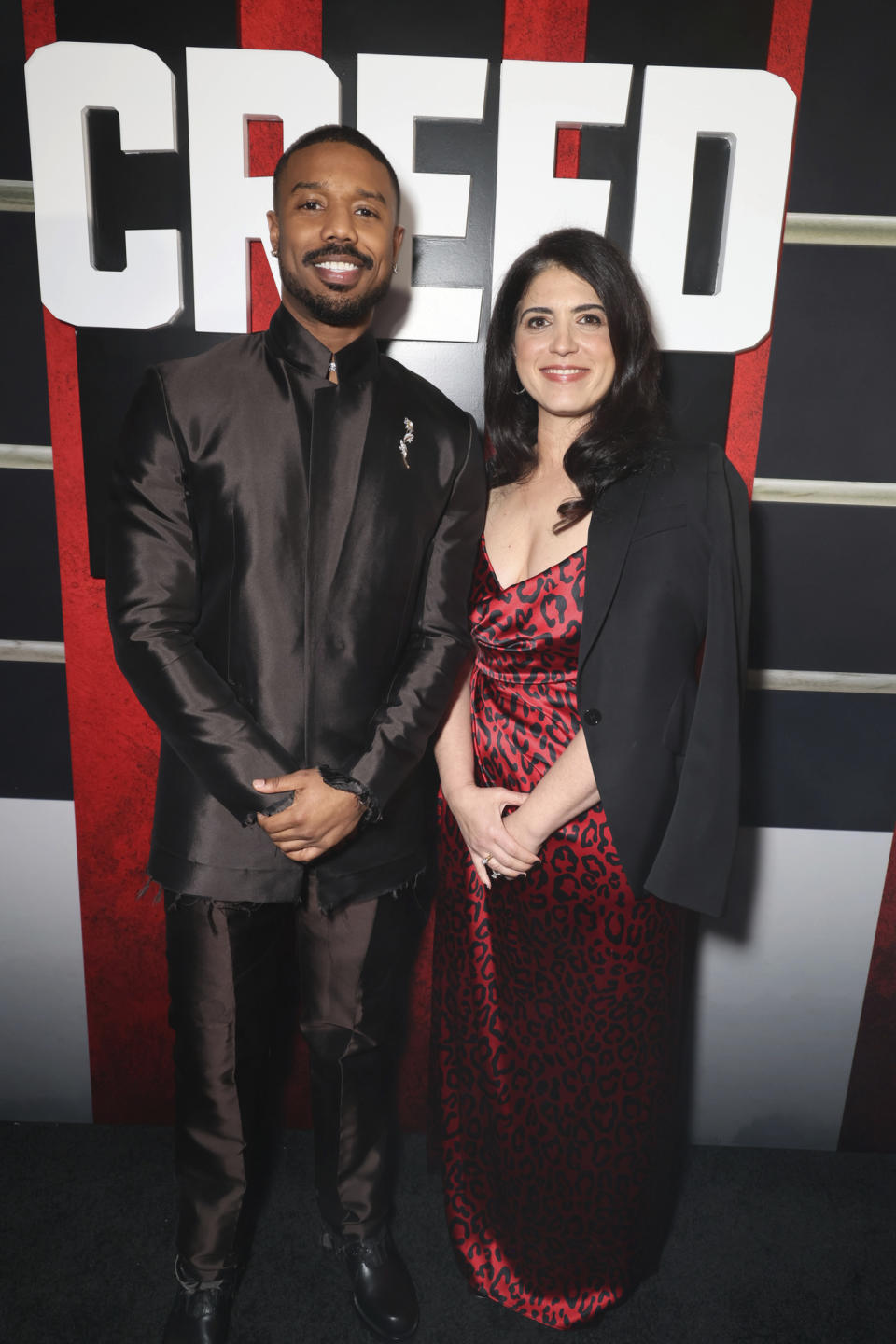
JORDAN: Feedback can be helpful, but I knew what I wanted the movie to feel like.
DEADLINE: You’ve been around a good long time, in seminal series like The Wire and Friday Night Lights and many movies. But you’re only 36 and your trajectory is still remarkable. You could have directed before this; what elements of this story resonated enough to convince you this should be your first as director?
JORDAN: I first tapped into my character Adonis nine years ago. And having had that opportunity to work with Ryan [Coogler] and Steven [Caple Jr., Creed II director] to help infuse what a character like Adonis would be going through, I felt ready. Here, it is a young black man, a professional who becomes famous and struggles with identity and success with those inner demons and insecurities, family dynamics all at once. I though much of that could be universal and relatable to a lot of different people. For me, it felt like who else was gonna be able to direct me in something that I felt like I’ve lived? These moments were really connected to me. All roads in my professional and personal life led to this moment for me to have this type of like scope and opinion and perspective and, mix that with the things that I needed to do in order for this film to be different and stand on its own and keep it new and fresh. Because look, if I did something that was safe, I would’ve gotten picked apart. I think we found the right balance in taking some wild creative swings, and that paid off for us.
DEADLINE: People will discover this upon the release of Magazine Dreams, the Sundance film that Searchlight will launch next awards season, in which Jonathan Majors plays a troubled amateur bodybuilder who falls down the rabbit hole. He has acting chops to spare. What made you feel he was the right guy to play the childhood friend who goes to prison on a gun charge to protect young Adonis, and then wants back what he lost?
JORDAN: This was two and a half years back, and I was impressed by where he started from. We met him, and we crafted the script and the character and just who he is as a person. Part of being a director is being a good talent scout, see how someone can use that talent and abilities. Talking with him, I could see we were similar in a lot of ways. He had an incredible work ethic. He was super talented, very complex and he could use that to tap into vulnerability and the deep emotions you see here. He also had this kind of intensity that was needed. He checked all those boxes. And also, boxing is a thing and you have to have the temperament to realize, this is how the fights are gonna go. We needed a person with a certain type of temperament who would be able to deal with that schedule and pace. I knew, knew, knew he could do it, and that if he dedicated himself to the process, it could do for him what I know it did for me. And he was down with that.
DEADLINE: When I spoke with you and Ryan on the first Creed film, your director said he went to Philadelphia to scout gyms. After watching the footwork of those Philly fighters he saw in the gyms, he called you and said, we’re not ready. You gotta come down and see the way these guys move. I recall it took an extra six months of hard ring work by you. So much of boxing is footwork, leverage, movement and balance. It’s easy to see if an actor in the ring is faking that. How long did it take for Jonathan to become ring ready?
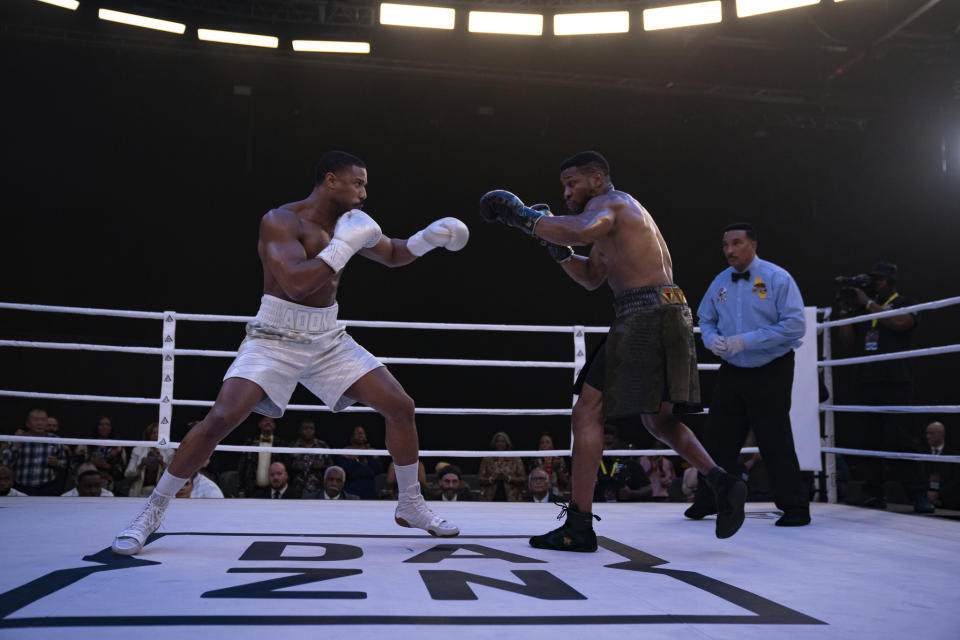
JORDAN: A year and change? He went off and started training. Then we started our training, our camp, before he went off to do Ant-Man, and we trained remotely with him via Zoom and FactTime and stuff like that with our boxing consultants and trainers. He was constantly working on that while he was doing Ant-Man. Then he came back and it was a six-week crash course. Boxing choreography, learning the fights, really refining the foundation he created the past year. We did everything we could to plan ahead and give him all the things that he would need in order to him to transform himself, doing much of the work on his own.
DEADLINE: I found it interesting that Jonathan’s character does exactly what Rocky Balboa could not do in that first Rocky movie: get a fairy tale shot at the title and win. But here, after Damian annihilates the champ [Jose Benavidez Jr], the narrative is he manipulated himself into that title shot and he’s a pure villain…
JORDAN: I would go more with antagonist than pure villain.
DEADLINE: Fair enough. How did you and your writers find the right balance as you messed there with the mythology of the original Rocky, the ultimate underdog story?
JORDAN: [Laughs]. To be honest, Mike, that’s the first time I heard that, the first time I ever thought about it. Really? Is that right? But that’s what I love about movies. You can create something authentic that makes sense for the character and the story. And people are gonna find ways that that relates to them, and their past personal experiences through films, through music, through whatever it is that resonated with you. So that was your way of looking at it, and that’s great. To me, it was the idea behind [Damian] reaching his dream that had been put off for 18 years. Getting out and finally doing it. To have to sit back and watch somebody else live his dream, that added to the fuel and the motivation for betrayal that was part of the complex dynamic between Adonis and Damian. We needed Damian reach the top, and achieve all his dreams and desires so he could take off the mask completely. And leave Adonis feeling that, before I knew it, this guy’s got everything. Those stakes had to be high enough to get our hero to come out of retirement. To get him back in the ring, it had to be about more than titles. It was the personal things, that’s what we really needed.
So that was a part of the formula, how high the stakes had to be in order to get Adonis back in the ring. And also, for Damien’s singular journey, he needed to achieve something he couldn’t, just by becoming a champ. He had to fight Adonis. They had to fight each other. That was the only thing left. They weren’t talking about it, and there was nothing left but for both of them to get in the ring and just go for it.
DEADLINE: Your reference to antagonist over villain is apt because Damian’s incarceration did come as he pulled a gun to save his young friend Adonis from a beatdown…
JORDAN: It had to get complicated. Now, he had a different mythology and a different approach to getting things. Yeah, he lied, manipulated the truth, and tried to divide and conquer. He wanted to uproot this whole thing and had time to study war. He is a tactician. He’s a strategist. He loves chess. Like, he’s always planning, in that journal. You know, we started the beginning of the movie off with them writing down in their notebooks, like a guy’s tells, what are his weaknesses and strengths? And he carried that on as he got out. So he was always planning his moment of return. Adonis was just too distanced to see it.
RAPOSO: Michael and Jonathan talked a lot about that in their process, finding an antagonist who is accessible and you could argue is right in their motivation. That was part of the special chemistry between Adonis and Damian, where you watch onscreen and find yourself asking, well, who was right?
DEADLINE: Sort of like Sonny Liston. Many rooted for the charismatic Muhammad Ali, then called Cassius Clay, because the charisma was boundless. Liston emerged from a really terrible childhood to become champion, and got little credit for that.
JORDAN: It’s what makes boxing great, these stories.
DEADLINE: Your Outlier partner Liz Raposo here spent 15 years at Paramount shepherding their biggest films and rising to president. For the first two Creed films you had Stallone, who patented the fight film, Irwin Winkler who first divulged you were going to direct this, and Ryan Coogler, who produced and co-wrote this after stepping away to direct the Black Panther films. When you decide not only are you going to direct Creed III but do all the things required of starring in it, who do you lean on and get the confidence to say, I can do this?
RAPOSO: Well, you were confident right away.
JORDAN: Well, I always kind of knew I could do this, it was more about how we were gonna do it. And I mean, failure wasn’t an option.
RAPOSO: Michael had a vision from day one. He knew what this movie needed to be. And as we see along with the rest of the world, there’s a piece of Michael in every frame, in every emotion, in every scene. He really put everything into this film, and it’s really inspiring to see, because now we’re seeing audiences showed up for that. They’re rooting for it. It’s just so satisfying and humbling. The challenge was to take Michael’s vision and how do we as a team execute that on a creative level, and on a time management level. Because as you said, Mike was pulling double if not triple duty, right?
We had a lot of healthy discussion about when you make a movie with a number on it, what new experience do you have to give the viewer? And I’ll, I’ll let Michael speak to some of those aspects as this conversation goes on, but it was, okay, what are we doing that’s bringing a new element to the story? We had a wonderful script by Ryan, Zach {Baylin], and Keenan [Coogler]. So we knew we had good bones and we talked about influences and visual language. What’s the genre of the movie inside the Creed franchise that we’re making? We made a genre movie inside a genre movie. So we had all of those parts moving at all times around us. We were all there to support Michael, but it was so clear from the moment I stepped into this role that he had an inspired vision for this.
DEADLINE: Michael, you did some interesting things with the camera. In that final fight, the crowd disappears, and it’s just you and Jonathan, with imagery of all the baggage you brought into that ring. Were there directors who helped inspire the style you developed here?
JORDAN: That ‘void’ scene came from my love of Japanese animation, the anime I watch a lot. The void seemed similar to anime. You have two characters fighting, who have really deep ties and emotional baggage. Emotionally, there’s quiet as they talk out how they feel in the way they express themselves, which is boxing. Everybody else, they see this vicious battle, but they’re talking in their own way and that made sense for Adonis and Damian, because there was nothing left to say in words. They had to handle things in the Warrior’s Way. We have a quadri-lingual film, as I like to say. English, Spanish, ASL, and then we have fighting. There was a moment where there was subtitles in the void, and we were like, no audio. Just subtitles and them punching with each punch part of the back and forth conversation. That was something I really wanted to bring into the fold to make the fighting feel different. Visually and emotionally, I wanted it to feel more intimate. You bring these different philosophies that I picked up over time.
But as far as overall visual style, that’s the thing I thought about most before I started filming. And as I actually started doing it, talking to and getting advice from active directors and my council of people whose opinions I trust, that helped. It could be a little thing or bigger idea thing. They’re like, don’t worry about that. You just do the job and tell your truth. By the end of it, somebody else can say what your style is, not you, not right now. You don’t have the perspective.
DEADLINE: Got a question, and if you wanna slip the punch you can. We discussed Sly, who’s not back because he was bitter about his original Rocky deal and being locked out of the generational legacy of that franchise. You can say that Chartoff Winkler empowered one of the great action star careers of our generation when they bought his script with the caveat he be the star. But the families of Irwin Winkler and the late Robert Chartoff control what has happened to Stallone’s creation and you can understand his bitterness. My question is, as one who’s emerging as a franchise fixture, what does all this leave you feeling about control and participation in franchise fare, not just now, but for your heirs?
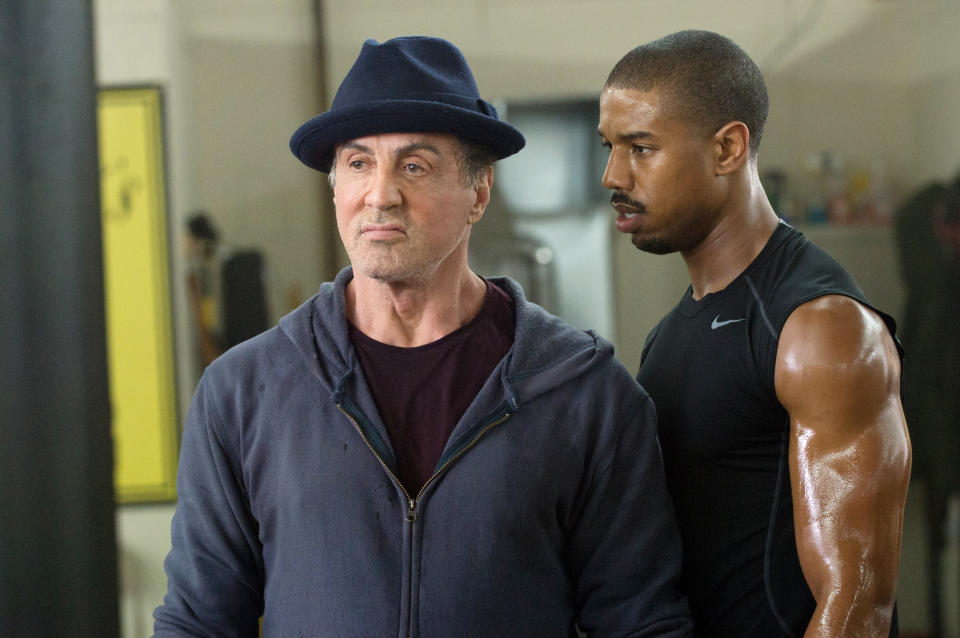
JORDAN: That’s a very intelligent question. And I love you for it. Cause there’s parts of that I really want to answer, but I feel like that’s such a slippery slope and I’m not sure how to answer that, right now.
RAPOSO: This maybe doesn’t answer your specific question about control. We’re excited about is, given our combined experiences, is taking Outlier to its next phase. We believe that given the incredible franchise IP we’re into that we can continue to show audiences that we make global entertainment with diversity and inclusion at its core.
JORDAN: This all gives us the currency to be part of the other big IP in a way that many production companies don’t really get that opportunity to do. Proving ourselves on this one shows that we can do this, soup to nuts. I hope it expands the pallet I have for IP, and developing other worlds.
DEADLINE: You know how Fruitvale Station affected me. Gotta ask you about your final scene in Black Panther, where your Killmonger chose a defiant death and referenced those slaves who threw themselves off those slave ships rather than subjugate themselves…
JORDAN: Bury me in the ocean, with my ancestors that jumped from the ships, because they knew death was better than bondage.
DEADLINE: You never see this kind of poignant reality in superhero films. It took me by surprise, choked me up and I thought to myself, damn, Ryan and Michael got me again. Can you reminisce a moment on that scene, what it took to reach that peak, in the arms of Chadwick Bozeman who left us much too early?
JORDAN: It was after a long grueling shoot, building toward this thing, battling and having this conversation between these two cousins. It was nature versus nurture. Having two guys that love and care about something so much that they’ll do anything to see its future protected, but with much different versions of how they see things. Building to that moment of being true to Killmonger, where I’m saying, I’d rather fall on my sword, I’m okay with that. It just spoke to what type of character he was and that he stands on a square.
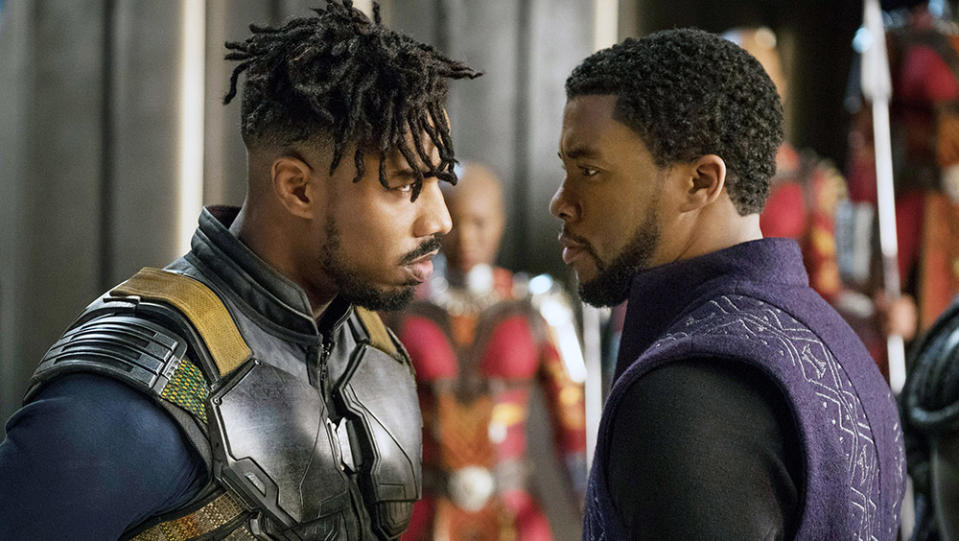
But for us, just as an actor to be able to experience that moment, with, with Chad and seeing what that scene and what that movie would do for the Black and African diaspora, having those conversations, breaking down those stereotypes and separation that’s been there for so long on what it means to be African, and what does it mean to be Black? What does it mean to be African American? It really started a conversation and you can see in the years following that, almost like a movement…it is special to know we had a little part in that spark, in furthering that along. Chadwick and I were honored to be a part of that, and I feel definitely like shortchanged of not being able to with him again, with those characters and continuing that conversation and that feeling of what we started. But also, not being able to work with him period is so hard. Just not having him here. So it’s bittersweet, to have a that scene with him that means more now than it did when we shot it.
DEADLINE: Do you realize in the moment you have done something exceptional and what do you, Chad and Ryan say right after?
JORDAN: [Pauses]. It was, you just kind of sit with it. Lot of tears and emotion, but not a lot was said. Just understanding what we were really trying to say. You know that everybody isn’t going to pick up on everything, But let’s remember these are two ancestors that are going at it right now, trying to get their point across, trying to save their people and what that means to the continent of Africa, our history and our lineage and what that means to us. And knowing that this is gonna be seen and heard and felt around the world meant we knew we had to bear everything and tap into something that was higher frequency than just acting. This was more than just a role…Yeah, man.
DEADLINE: When I interviewed Jonathan for Magazine Dreams at Sundance, he said you tagged him pretty good a few times. I recall Sly saying that when he and Dolph Lundgren squared off in Rocky IV, he told him they should both throw all the had for like 45 seconds. Sly said he got hospitalized with an inflamed heart. How intense does it get in that ring?
JORDAN: It’s very intense. Those first days, those first couple takes, the adrenaline’s gonna be through the roof. You have to adjust to that. Then you start to settle in and maybe take a little bit off your punches. You start feeling the real rhythm, the atmosphere, and you got people there to help. But we are fighting. You’re talking him through the process, getting him caught up with the formula of what we do and how we make these movies. But you’re going to get hit. It’s an expected thing, but it’s going to happen. You cannot take it personally, unless you want to because you can use it. Guys do use it. We used it.
DEADLINE: So he hits you too hard. Do you return fire?
JORDAN: It can’t work like that.
DEADLINE: It must be extra challenging when you are the director. If you are distracted thinking about shots, you could end up crumpled on the canvas.
JORDAN: It’s understanding my cast and what’s needed in the moment. I lead by example. I think one of the beautiful things is like, I could direct with my performance. I didn’t really understand that until I was in it. Adonis as a whole, throughout this film, throughout this last fight…he’s coming outta retirement. He’s regaining his shit. It shouldn’t feel like he’s winning the entire time. He’s feeling like an underdog. I let that intensity be because I knew we needed it. If I took a hit, I wasn’t gonna tell [Majors] to stop. Cause it looks great, and I know it’s what we need. I mean, when I get back to the corner, I’m like, ‘whoo, shit. That boy leaned into that one. That was good.’ When I go back out, I’m not letting him know that, though. Just, keep it coming. That’s the understanding. You know what I told him in the beginning? Yo, you’re a Ferrari. I’m gonna drive you, and I need you. We’re not gonna keep you cooped up. We’re gonna let you go, because that’s what this needs. And I gave him the space to do that. Now, of course, slow mo shots, and it’s hey, look, you’re about to get rocked right now. Cool. All right. Set it up. Boom. We figured it out. I know he’s gotta give me one too. So at that point, we’re not trying to hurt each other. We just want the best looking shot. And we go right to the monitors. Well, he doesn’t look at playback, so it was one of those things where he had to trust me. But I knew when we got it.
RAPOSO: Jonathan and Michael spent so much time together prepping these fights. Michael did an incredible job, really walking Jonathan through what it’s like to be in the ring for a movie like this. This was Michael’s third film, having to do all this training, and choreography. So seeing him lead Jonathan and really mentor him was very fulfilling.
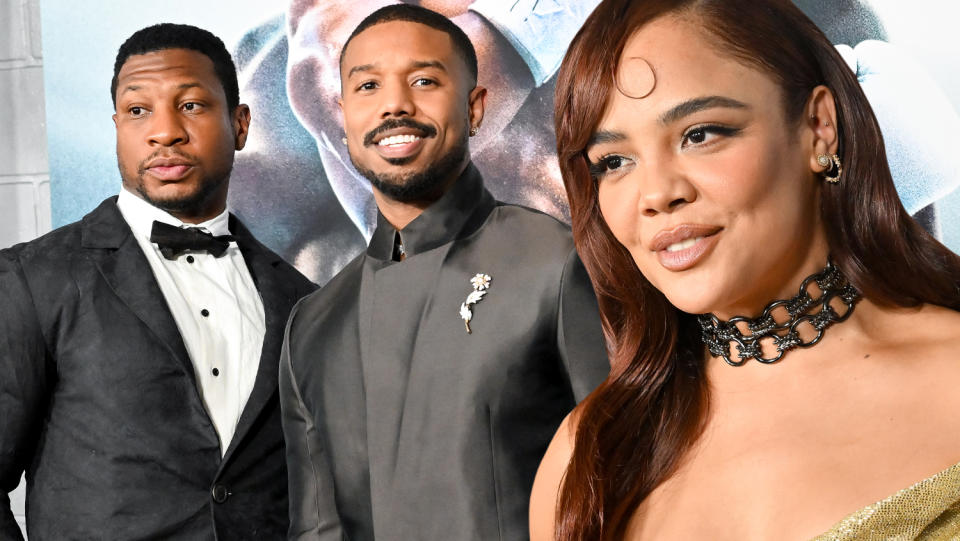
JORDAN: Something that was satisfying for me was to see him in character. Like, whenever he became, like when he was Jonathan, he was one way. When he was Dame, and that style and the things that we cultivated, it was like, damn, this is the product of all the work we did. Oh, my God, it’s coming together. This is great, and there was no way I was going to coop that up in any way.
DEADLINE: A record breaking weekend like this one can be a game changer. You’ve proven you belong behind the camera. How do you use this momentum?
RAPOSO: Michael is an exceptional filmmaker and a director with real vision. So for us, it’s identifying what can be next for him in that arena. It’s absolutely going to happen.
JORDAN: The balance is me, acting, and directing, and the time commitment that goes into directing and how that takes me out of other things that I may want to do in front of the camera. You’re catching us at the weirdest most transformative moment., Like it’s still Sunday, numbers are still rolling in. And I’m kind of speechless. I don’t have perspective on this stuff yet. I just remember three years ago, trying to figure out how we’re gonna shoot the boxing with a thousand less extras because of damn Covid protocols. I’m like, how are we doing this? How many days for fighting? I’m awed by my team and the grit and drive we showed to get this done. But I am selectively ambitious, and I want to use this momentum in the right way. I’m not going away for five years.
RAPOSO: We’re particularly thrilled about just the number of firsts that this movie is giving. It’s the the first movie that we made together for our home studio at Amazon which made sure the world believed in it too, under Jen [Salke’s] leadership. It’s the first sports movie ever to be shot in IMAX, and the highest opening sports movie of all time. It’s beyond what we imagined.
JORDAN: Whatever the door this opens, I’m walking through it and I’m gonna figure it out. I think it will bump up some of the other IP we have been developing.
DEADLINE: When we first revealed you deal at Amazon, you talked about the branding opportunities possible in being part of the world’s largest retailer. I’ve seen certain people come to the table with a lot less than you got and turn themselves into billion dollar brands, endorsing things like fashion and lifestyle products. How have you harnessed this?
JORDAN: It’s going great, man. That was the vision, and that was the one of the main reasons why I wanted to go over there, because they had those tentacles and an ecosystem that could maximize my ambition. There are things being put in place and moving forward to really take advantage of the x-ray of this. Finding new ways to bring movie experiences from home and vice versa. One thing Covid exacerbated is the theater experience at home. How do you increase the experiential nature of that? That, the merchandising potential, this movie just opens the door in a real way to take advantage of that.
RAPOSO: Some of the marketing partnerships, just specifically on Creed III, Amazon and Michael saw the potential of that. Whether it’s the sports clothing line or anything else connected to the movie, it was a great experience seeing the power of our home studio really engage on that level. It was where Michael wanted to go. We have a Creed III merchandise page on Amazon.
JORDAN: Being involved developing the merchandise in a real hands-on way, was important to me, as was leaning in on digital social media marketing in a big way. I’m disruptive in a good way, and how you evolve in this evolution is really important. How can you do it better? Having the right people in place is so important. Warner Brothers, MGM and Amazon, all three were my homes at one point or another, and they were all rolled up into one here. We had a short hand, working with people I’ve known a long time, and having them root for the things I’m doing in a real way. And now, it’s mutually lucrative for everyone in the best way possible, like a perfect storm.
DEADLINE: You are working toward a reteam with Ryan Coogler on The Wrong Answer, there’s The Thomas Crown Affair remake, a teaming with Will Smith in the I Am Legend sequel. And clearly more Creed. What’s next?
JORDAN: [Laughs] I don’t know, man. I’ll say two things. One is, it goes back to the other question of figuring out what’s the best move for me in my time right now, and balancing where we are at the moment and taking advantage. But right now, I need a slight reset and I’ll be able to see a story that I want to tell, knowing that I can do everything and not have to wait on other things that I might have had to wait on if I was just an actor. Do I just want to act next, while I’m soft prepping this other thing and roll right into that next year to maximize my time that way? Or direct one of my other television shows that I’m doing, a pilot for this or that? There are incoming calls that I’m getting like, this weekend. With new stuff and I’m like, what? That’s surreal. Maybe it could be one of a couple unknown things I should do.
Best of Deadline
Sign up for Deadline's Newsletter. For the latest news, follow us on Facebook, Twitter, and Instagram.

